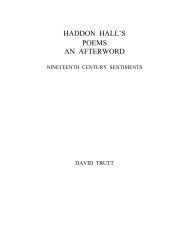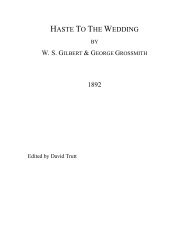WS Gilbert A Mid-Victorian Aristophanes - Haddon Hall
WS Gilbert A Mid-Victorian Aristophanes - Haddon Hall
WS Gilbert A Mid-Victorian Aristophanes - Haddon Hall
Create successful ePaper yourself
Turn your PDF publications into a flip-book with our unique Google optimized e-Paper software.
4 W. S. GILBERT A MID-VICTORIAN ARISTOPHANES<br />
The gods came in for their share; so did the institutions dearest to the Athenians; so<br />
did the most popular and powerful individuals, often by name. The freedom of speech is<br />
staggering to our ideas. Athens was fighting a bitter war [Peloponnesian War against<br />
Sparta, 431 BC - 404 BC] which was ultimately to crush her and to end the glory that was<br />
Greece, but <strong>Aristophanes</strong> was free to say exactly what he pleased. If an American had<br />
produced a play, after we entered the war [WWI], which represented General Pershing<br />
and Admiral Sims as wanting to desert; which denounced the war, praised the Germans,<br />
glorified the peace party, ridiculed Uncle Sam, that play would have had a short life, but<br />
that is just what <strong>Aristophanes</strong> did in play after play, and the Athenians, pro- and anti-war<br />
alike, thronged the theatre. The fundamental thing to the Athenian was a man’s right to<br />
say what he chose.<br />
The best known of <strong>Aristophanes</strong>’ plays are the Birds, where Athens is shown up in<br />
contrast to the Utopian city the birds build in the clouds; the Frogs, a parody of popular<br />
writers; the Clouds, which makes fun of Socrates and the intelligentsia who “walk on air<br />
and contemplate the sun”; and three plays about women, the Thesmophoriazusae, the<br />
Lysistrata, and the Ecclesiazusae, in which the women take hold of literature, the war and<br />
the state, to the great betterment of all.<br />
To find the writer most like <strong>Aristophanes</strong> one must go to an age as unlike his as<br />
Shakespeare’s was like. The turbulent democracy that gave birth to the Old Comedy, and<br />
the England over whose manners and customs Queen Victoria ruled supreme, had<br />
nothing in common and yet the mid-<strong>Victorian</strong> <strong>Gilbert</strong> of Pinafore fame saw eye to eye<br />
with <strong>Aristophanes</strong> as no other writer has done. The case with Shakespeare is reversed.<br />
The differences between <strong>Aristophanes</strong> and <strong>Gilbert</strong> are superficial; they are due to the<br />
differences of their time. In their essential genius they are alike.<br />
The unknown is always magnificent. <strong>Aristophanes</strong> wears the halo of Greece, and is at<br />
the same time softly dimmed by the dust of centuries of scholarly elucidation. A<br />
comparison therefore with an author familiar and beloved and never really thought about<br />
wears a look of irreverence, — also of ignorance. Dear nonsensical <strong>Gilbert</strong>, and the<br />
magnificent <strong>Aristophanes</strong>, poet, political reformer, social uplifter, philosophical thinker,<br />
and a dozen other titles to immortality, — how is it possible to compare them? The only<br />
basis for true comparison, Plato says, is the excellency that is peculiar to each thing. Was<br />
<strong>Aristophanes</strong> really a great lyric poet? Was he really bent on reforming politics or ending<br />
democracy? Such considerations are beside the point. Shakespeare’s glory would not be<br />
enhanced if Hamlet’s soliloquy was understood as a warning against suicide, or if it could<br />
be proved that he was attacking the social evil in Pericles.







